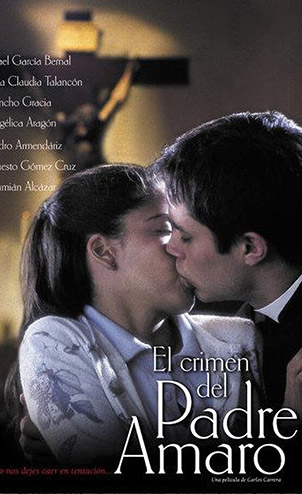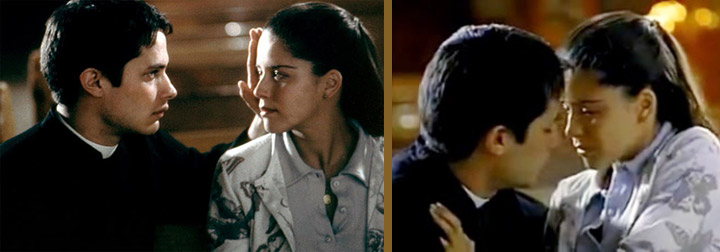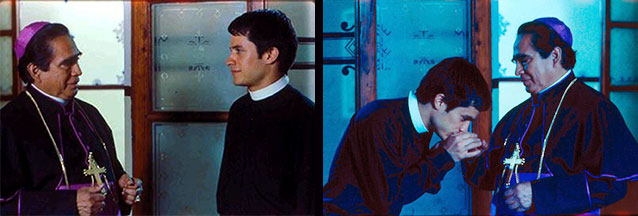The Crime of Padre Amaro | El Crimen del Padre Amaro
This was the official website for the release and promotion of the 2002 movie The Crime of Padre Amaro:​. This page has been recreated from the site's archived pages and other outside sources.
TomatoMeter Critics 62% | Audience 74%
The Crime of Padre Amaro:​ SYNOPSIS
A priest discovers the path of virtue can be steep, and temptation can demand a heavy price, in this controversial drama from Mexico. Father Amaro (Gael Garcia Bernal) is a young Catholic priest whose mentor, the Bishop (Ernesto Gomez Cruz), expects great things from him. However, like all priests, Amaro must first be assigned where he is needed most, which leads him to the small rural community of Los Reyes, where Amaro is to assist Father Benito (Sancho Gracia). To his shock, Amaro discovers Benito is hardly following Holy Law -- he's having an affair with Sanjuanera (Angelica Aragon), a woman who runs a local restaurant, and he's been helping a drug dealer launder his profits in exchange for large donations to the church, which Benito feels is justified as the funds are being used to build a hospital and orphanage for the poor. Amaro is disgusted with Benito's actions, but he soon discovers his own weaknesses when he falls in love with Amelia (Ana Claudia Talancon), Sanjuanera's teenage daughter. As Amelia finds herself falling for Amaro, she breaks off her relationship with Ruben (Andres Montiel), a reporter. Ruben responds by publishing a story which reveals the details of Benito's dealings with the drug dealers; Benito in turn tries to lay the blame at the feet of noble Father Natalio (Damian Alcazar), whose work with local peasants has been wrongly interpreted as supporting armed revolutionary factions. As Amaro tries desperately to distance himself from the growing scandal, he receives shocking news from Amelia when he learns she's pregnant with his child. The Crime of Father Amaro's portrayal of corruption within the Catholic Church led to an outcry from Catholic organizations, both in Mexico and the United States, where they attempted to organize a boycott of the film. However, the tactic failed in Mexico, where the controversy helped to boost ticket sales, making it the highest-grossing Mexican film ever in its native country.
Rating:R (for sexuality, language and some disturbing images)
Genre: Art House & International, Drama
Directed by: Carlos Carrera
Written by: Vicente Leñero
In Theaters: Nov 15, 2002 limited
On DVD: Apr 1, 2003
Runtime: 120 minutes
Studio: Samuel Goldwyn Films
+++
CAST
Gael García Bernal .... Padre Amaro
Ana Claudia Talancón .... Amelia
Sancho Gracia .... Padre Benito
Angélica Aragón .... Sanjuanera
Luisa Huertas .... Dionisia
Ernesto Gómez Cruz .... Obispo
Gastón Melo .... Martín
Damián Alcázar .... Padre Natalio
Andrés Montiel .... Rubén
Gerardo Moscoso .... Doc
Verónica Langer .... Amparito
Pedro Armendáriz Jr. .... Presidente Municipal
Lorenzo de Rodas .... Don Paco
Roger Nevares .... Padre Galván
Fernando Becerril .... Galarza
Jorge Zárate .... Padre Mauro
Rosa María Castillo .... Chepina
Blanca Loaria .... Getsemaní
Juan Ignacio Aranda .... Chato Aguilar
+++
CRITICS REVIEWS
February 14, 2006
Globe and Mail Top Critic
It's not hard to see why Mexican audiences are lapping this up.
+++
February 14, 2003
Peter Howell Toronto Star Top Critic
For all of the criticisms of the Church in El Crimen del Padre Amaro, Carrera is quick to defend the basic humanity of his characters.
+++
December 5, 2002
Stephanie Zacharek Salon.com Top Critic
Nothing more than a stifling morality tale dressed up in peekaboo clothing.
+++
December 10, 2002
Ann Hornaday Washington PostTop Critic
The Sins of the Fathers
Carlos Carrera's "El Crimen del Padre Amaro" opened in Mexico recently and quickly became the most successful indigenous film ever in that country. Carrera and screenwriter Vincente Lenero most likely would attribute that success – as well as a promising early run in U.S. art houses – to the film's bold confrontation of political issues within the Catholic church.
Fans of "El Crimen del Padre Amaro" ("The Crime of Father Amaro") have probably been more interested in luxuriating in its melodrama, so tawdry as to hark back to the "women's pictures" of the 1940s. Those films, like this one, often couched subversive social commentary within soapy plots and tragic characters. Formally speaking, "El Crimen del Padre Amaro" is as pandering and simplistic as the worst of the weepies, but there's no denying that it's hitting a nerve – one made all the more raw with each revelation of abuses of clerical power.
The film opens with Father Amaro (Gael Garcia Bernal) traveling by bus through the Mexican countryside. The last time audiences saw Bernal, he was driving through the same sort of country in the scorching, sensual coming-of-age tale "Y Tu Mama Tambien." Unlike that film, "El Crimen del Padre Amaro" doesn't boil with sexual energy as much as simmer. Young, handsome Father Amaro arrives in a tiny rural town to assist its church's priest, and he immediately draws appreciative glances from the pious young women who teach catechism. One in particular, the devout Amelia (Ana Claudia Talancon), is drawn to the priest, who finds himself similarly attracted during a particularly erotic confession. Soon enough, they consummate their mutual passion. In the meantime, Amaro's parishioners and colleagues are all pursuing their own extra-ecclesiastical activities, from Padre Benito (Sancho Gracia), who observes his vows of chastity only selectively, to Padre Natalio (Damian Alcazar), whose brand of liberation theology has the conservative bishop in a sanctimonious swivet.

Based on a 19th-century novel by Eca de Queiros, "El Crimen del Padre Amaro" leads inexorably to a Grand Guignol of tears, recriminations and even death. But within the confines of such overheated emotion, both Bernal and Talancon succeed in finding layers of quiet complexity in their ill-fated characters. It's understandable that, for millions of lay Catholics who currently feel betrayed by their leaders, this unforgiving portrait of clerical hypocrisy might be cathartic. And surely Catholics aren't the only ones who can relate to the film's message. "El Crimen del Padre Amaro" is a lurid but timeless reminder that the bureaucracies and regulations of organized religion have nothing to do – indeed are often at odds – with living a God-ward life.
EL CRIMEN DEL PADRE AMARO (R, 120 minutes) – Contains sexual activity, profanity and some disturbing images. In Spanish with subtitles at area theaters.
+++
July 31, 2004
S. James Wegg JWR
Confessor heal thy self
 Carlos Carrera’s too believable study in hypocrisy focuses on the Roman Catholic Church but could easily be applied to business, governments, the media—any organization that purports to know what’s best for others, and has the resources to enforce its will.
Carlos Carrera’s too believable study in hypocrisy focuses on the Roman Catholic Church but could easily be applied to business, governments, the media—any organization that purports to know what’s best for others, and has the resources to enforce its will.
But, like the middle-class “dogs” in Filantropica (cross-reference below) it is the powerless faithful that pay the price.
In the opening sequence we meet Father Amaro (Gael Garcia Bernal whose good looks and lusty slide into corruption would have been more convincing if the original—Eca de Queiroz’s 1875 novel—time setting had remained; in the present day, surely his faith would have evaporated long before answering his “call”) and see him perform his only charitable act (incongruously repaid in the final act) after the metaphorical bus hold-up assures us this priest is good.
Once he arrives at his new post, we soon discover that his mentor, Father Benito (given a totally convincing performance by veteran Sancho Gracia) has rationalized his considerable money-laundering operation (drug cash for, allegedly, the construction of a “good works” hospital) and long-standing affair with a comely and loyal restaurateur (Angélica Aragón). But with a stated philosophy of “The only hell is loneliness,” all is forgiven.
Like Father like Son, for soon Amaro is giving the beautiful waitress, Amelia (Ana Claudia Talancón), who eagerly drops her journalist boyfriend, Reuben (played with appropriate angst by Andres Montiel) to take her Catechism lessons in bed, no doubt encouraging her devotion to his heavenly member even as he communes with her flesh. Unfortunately their rhythm wasn’t immaculate and the suspect services of the Dionisia—whose literal cat house is filled with give-away foreshadowing mangled baby dolls—are required. Luisa Huertes excels in this portrayal of a tormented wretch whose assistance can be bought and whose silence can be secured with a permanent seat in the front pew, praying beside the Mayor.
Meanwhile, the Bishop (Ernesto Gómez Cruz) uses his power to buy the media (“You will print a front page retraction to your story about how the Church is in bed with the drug lords or your advertising will disappear”—pure fiction, this could never happen in Canada!) and the ex-communication of the only honest priest in Mexico. Naturally, the damning article was written by the jilted Reuben so he too discovers that even managing to reveal the truth doesn’t change much. And, in one marvelous scene, Beethoven’s piano concerto masterpiece provides the inspiration for the Bishop’s next act of self-serving treachery as he soaks to its strains in the holy tub.
Little wonder this film received such a rocky reception in Mexico: by its end, evil has triumphed, the scandals discovered but ignored; all the usurped Father Benito can do is push his wheelchair away and count his blessings. JWR
+++
AUDIENCE REVIEWS
** Andy P
June 8, 2008
Saw this film on DVD while staying at an amazing Maui rental that my wife found. We were celebrating our tenth anniversary at the same resort, Kapalua, where we were married. We had spent the morning snorkeling off one of the beaches on the western coast of Maui, then playing a round of golf in the afternoon at one of Kapalua's championship golf courses. Wiped out, we decided to order in and just relax watching a movie. The condo that we were renting had a closet full of DVD's and when we saw The Crime of Padre Amaro starring Gael García Bernal, we knew that was the movie choice for the evening. Sure it's a bit over the top with the sensationalism of the plot, but you can't deny the film's clear condemnation of the Catholic church's hypocrisy and abuse of power. We both enjoy Gael Garcia Bernal and felt this was one of his best roles. With such a limited run, we never saw the film when it was first released. But you can rent it on Netflix.
+++
***1/2 Mike C
December 22, 2013
A Oscar nominee for Best Foreign Film, plus Gael Garcia Bernal, plus anti-religious overtones? What's not to like about this movie. Well, several things. It's okay, maybe even above average, but it falls short of my standard set by some recent Oscar noms in that category.
Bernal is one of my favorite actors. He's flat in this, as is just about everything. It's clearly a story with a point, and said story takes center stage. The actors are merely there to deliver the lines. So in that regard, Talancon as Amelia shines as a complete smokeshow. She's not a real likable character (there is about one in the entire movie), but she's nice to look at.
The topic is quite controversial and, I'm guessing, is why it was nominated for an Oscar. Certainly none of the acting performances were mesmerizing. You have strife and cover up and hypocrisy within the church, all building toward a (sadly) predictable end. I had a pretty good idea of what was coming.
Definitely, there are some valid ideas to take from the film. More than the final questions posed, I like the conflict throughout the movie. Power corrupts and why should the church be any exception? Given the amount of power it has, it only follows it would be more corrupt.
+++
***** Georgiana A
April 21, 2013
Brilliant film. Challenging, well scripted and acted.
+++
**** Indra W
January 23, 2013
Controversial, and very bold considering the situation in Mexico. Thumbs up!
The setting makes makes the story so original, although it is about common morality problem.
+++
**** Frances H
March 3, 2016
Excellent film about the hypocrisy and the corruption of organized religion that provides a harbor for the corrupt, while they throw out those who truly try to follow their morality uncompromisingly.
*** ½ Hector R.
July 16, 2015
It isn't the best job of Gael García Bernal, but it's a acceptable performance. This film shows us the Catholic church's dual morality, and the thin line between good and evil. It's interesting, but I expected more controversy that an bored and overreacted melodrama. Undoubtedly, it's not as good as another mexican movies.
+++

** Michael M
November 8, 2012
I'm always on the look out for interesting foreign language films--being the film buff that I am. =o) I've gone from Chinese movies to Indian to French films... and now I'm checking out Mexican flicks.
I bought a copy of "El Crimen del Padre Amaro" partly because of its lead, Mexican actor Gael Garcia Bernal, and partly because I was thinking that with all the hype received by "Amores Perros" and "Y Tu Mama Tambien", this might be a good one too.
I saw the movie. Nothing out of the ordinary here. It actually plays out like most of the Tagalog films I've seen--typical, predictable, lackluster. In fact, some of the Mexican telenovelas that made their way to Philippine shores had better, more engaging stories.
But that's not to say that the acting isn't good. It is. Garcia Bernal's performance was about the only thing that held my interest in the film--something the script should have mainly done. Well, you can't have everything. =o)
Plus, with the whole young-priest-meets-real-world plot having been mined so many times before, the creative forces behind "Amaro" could have at least added some peculiar plot points to, say, steer it away from its much better predecessor "The Priest" ( which starred Linus Roache).
Still, this movie helps make my collection varied and diverse. So, I can't really complain. =o)
+++
OTHER REVIEWS
El Crimen del Padre Amaro (The Crime of Father Amaro)
Review: haro-online.com
With the Catholic Church currently mired in controversy, a movie like El Crimen del Padre Amaro is sure to piss people off. The movie deals with corrupt priests in Mexico, in particular the corruption of Father Amaro (Gael Garcia Bernal, Y Tu Mama Tambien, Amores Perros). The irony is that the movie is based on the novel by Eca de Queiros, first published over a century ago. Director Carlos Carrera (Under a Spell, Return to Sender) deftly updates the movie, placing nearly every element believably into current times, however he seems more concerned with stirring controversy than with anything else. The major weakness of El Crimen del Padre Amaro is that it often feels sensationalistic and melodramatic.
Amaro is a fresh priest, sent off to a remote section of Mexico. His ideals are intact, his morals pure, and he is eager to serve any way he can. What he finds shocks him. Padre Benito (Sancho Gracia, Common Wealth, I Won't Let You Down) has a mistress, Sanjuanera (Angelica Aragon, Bloody Proof, Picking Up the Pieces), and there is huge dissension amongst the priests. There are rumors that Benito is corrupt, as well as rumors that Padre Natalio (Damian Alcazar, The Blue Room, Pachito Rex) is working with guerillas. Amaro's temptation comes in the form of Amelia (Ana Claudia Talancon, The Comet, El Juego Sin Reglas), the beautiful young daughter of Sanjuanera. Amaro's lust for Amelia proves too much, and she is too innocent to resist.
This is Bernal's best role to date, because it is not as over-the-top as his other material. It requires more subtlety and restraint, since the Amaro character is internally trying to reconcile his desires with his faith. Still, Vicente Lenero's (The Blue Room, Herod's Law) adaptation movies in the typical manner, adding in an utterly lame plot device that ups the histrionics to a nearly unbearable level. For the first half, El Crimen del Padre Amaro works because it quietly subverts Amaro's beliefs and views, slowly corrupting this pristine person. Changing the tone so drastically ruins much of the effect of this work. Most of the other characters seem straight out of a soap opera, and have little substance to them. Benito and Natalio are not the only priests, but they are the only ones with more than a few lines.
Mongoose Rates It: Not That Good.
2 hours, Spanish with English subtitles, Rated R for sexuality, language, and some disturbing images.
